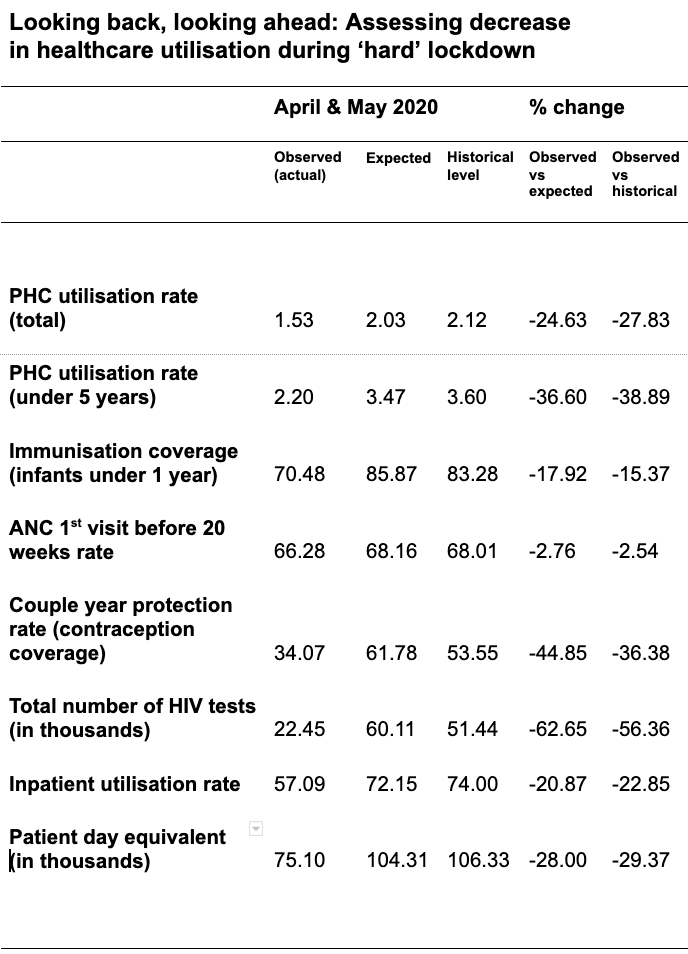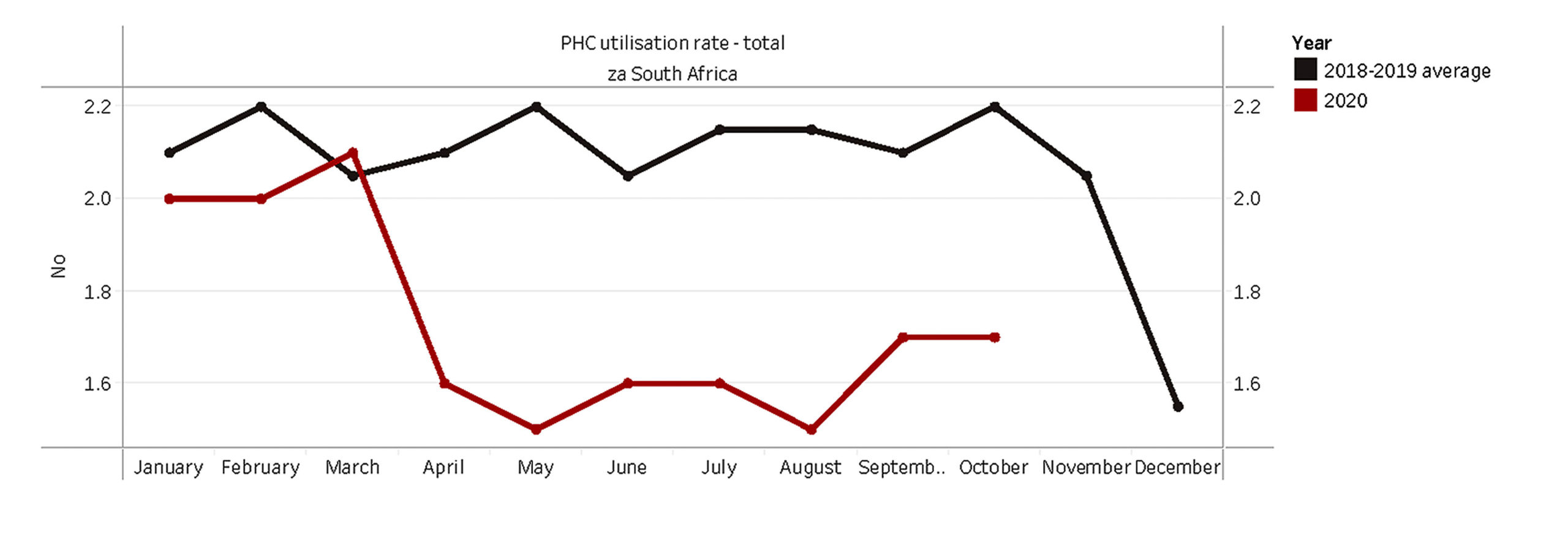In September 2020 we gathered a team from various disciplines and universities to examine the short- and the medium-term impact of the coronavirus on public sector preventive services.
Previous epidemics and modelling have shown that this is the part of health services that is often the worst affected: it easy to see how there would be less of a perceived urgency regarding an HIV test, the six-week immunisations of a baby or collection of contraception – especially when compared to an acute illness with painful symptoms that prevents you from working or fulfilling your household duties.
We, for instance, see that high-benefit individual health services such as early access to antenatal care have not been affected as much and recovered very rapidly. Of course, services to pregnant women have also been prioritised by provinces, so there would also have been less disruption from the supply-side.
We are concerned about the impact of the pandemic on preventive care because we know that decreases in immunisations, screenings or contraception can have disastrous consequences over the long-term, including an increased incidence of HIV (for condoms in particular), outbreaks of preventable childhood illnesses like the Rotavirus and measles; a rise in the share of undiagnosed HIV cases or an upswing in unwanted pregnancies.
These indirect long-term impacts of the virus on health outcomes can dwarf the direct and short-term impact of Covid-19 itself. Several shocking numbers have been quoted in the media, but they were often based on particular provinces or clinics, or anecdotal and did not provide a reliable and national picture of the impact.
While the National Department of Health has put the message out there – stressing the importance of continuing chronic treatment and the risk of delaying immunisations – the data suggest these campaigns have been slow to show an effect.
We see that for HIV tests, immunisation and contraception utilisation was well below expected levels in August in 75% of the districts, and only started returning to expected levels six months later, by October. Also, while preventive services have made a recovery, hospital stays and overall utilisation were still well below expected levels by October.
The long-term consequences of these declines in health services utilisation will emerge over time. But at this point, it is already clear that we cannot afford this to happen again and need to learn from past mistakes in how we navigate the trade-offs between containing and treating Covid-19 while securing the continuity of core health services in 2021.
 Data source: DHIS January 2018 to May 2020. Note: Expected levels are projections based on a model using data from January 2018 to March 2020 with out-of-sample projections for April and May 2020 [population share-weighted sum of districts].
Data source: DHIS January 2018 to May 2020. Note: Expected levels are projections based on a model using data from January 2018 to March 2020 with out-of-sample projections for April and May 2020 [population share-weighted sum of districts].
Preventive services such as immunisation and contraception were still below expected levels in 75% of districts by August 2020. These unmet needs are corroborated by survey results for the uninsured segment of the population where 23% reported not seeking acute care when needed and inability to access medication, contraceptives or condoms.
The concern is that how we have been communicating risk and threat of the pandemic may have amplified the unintended consequences of the virus. The government initially took a blanket approach and locked down low-risk areas when there were outbreaks in the Cape Town metro and Gauteng. The recent transition to a risk-adjusted approach can make a big difference in unintended fear effects – and an earlier transition to such an approach could have helped to speed up the slow recovery in health utilisation.
Trends in overall health care utilisation for 2020 vs previous years: Primary Health Care utilisation per person, January 2018-October 2020.

Trends in contraception coverage for 2020 vs previous years: Couple year protection rate, January 2018-October 2020

It is a further concern that Covid-19 fears appear to have disproportionately affected the healthcare utilisation of the poorest and most vulnerable groups. At the end of June, we conducted an SMS survey of more than 3,000 pregnant women and women with babies under a year old using the public sector. We found that of those who did not visit the clinic in May and June, 45% of the poorest 40% of respondents reported fear of contracting the virus as the reason for non-attendance, while such fears were cited by 33% of the remaining 60% of women.
In a follow-up SMS survey, we asked respondents about their main worry. They were able to leave the response empty or to enter any text within the 160-character limit set for an SMS. The replies included many broad worries about Covid-19, but also many specific concerns about how to keep their unborn or young children safe from the coronavirus.
One mother replied that she was worried about “going to the clinic for my baby’s vaccine and afraid of contracting coronavirus”. Another explained that she had a complication in her pregnancy: “I have gotten overprotective for my baby. With this virus I’m so scared to leave my house.” One mother with a newborn said she was worried about infecting her baby: “I worry that we may put her life in danger going to the clinic and Home Affairs”.
Seen more broadly, the vulnerable and the poor have borne a disproportionate share of the job losses and the increases in hunger and the hardship that the lockdown has brought, which is anticipated to have dire consequences on health outcomes over the medium and long term.
The unintended consequences of the pandemic are likely to deepen the self-reinforcing relationship between poverty, vulnerability and poor health and it is thus vital to closely monitor these effects on district-level to enable timely policy responses. DM/MC
Ronelle Burger is a researcher at Stellenbosch University’s Economics Department and Candy Day is a technical specialist at the Health Systems Trust.
The full report on unintended healthcare utilisation consequences of the pandemic is available here: https://cramsurvey.org/reports/#wave-2. The report covers the first 150 days and does not include the September and October data shown here.




